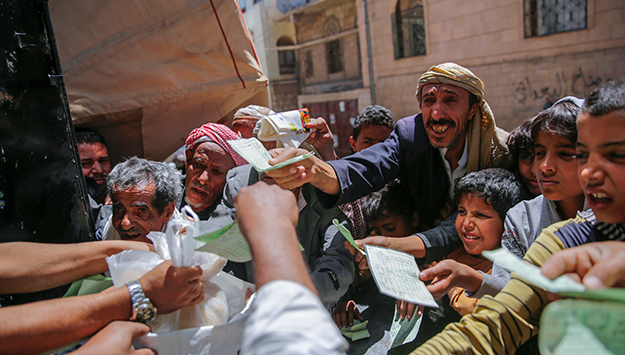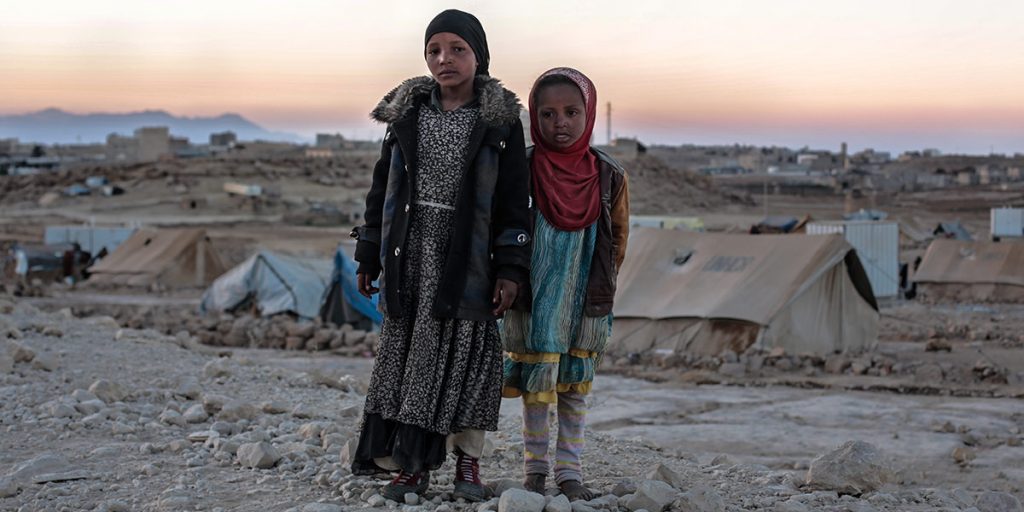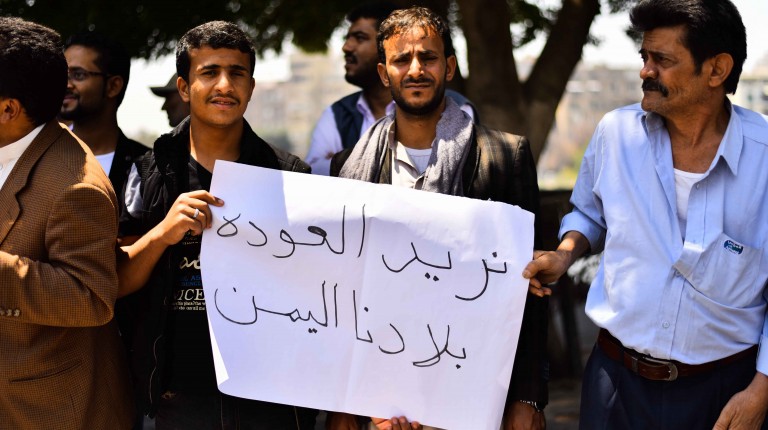Partially hidden under the Dokki bridge is a little restaurant where a multitude of quiet individuals gather to scoop vegetable and meat tagines with malahwah bread. Prices are kept low as it is one of the few places where Yemenis, many of whom are refugees or students, can afford to have a little taste of home. These ones, Yemenis who easily find their compatriots in Cairo’s Roda island or in Mohandessein, are perhaps considered the lucky ones; many are not in their shoes.
Many are stranded, afraid and lost in Egypt’s megacity- this is the disheartening situation of around 10,000 migrant Yemenis living in Egypt today. As the air raids and explosions engulf their country back home, they are desperately trying to make a living while yearning for the moment of return.
Egypt is one of the few countries that allow Yemenis in, with Saudi Arabia taking in the largest amount of two million Yemenis out of six to eight million expats.

Being the poorest nation in the Arabian Peninsula, most Yemenis struggle to flee to Europe and the United States, so they resort to countries in Africa. Nevertheless, their status in Egypt remains unknown and their suffering often happens in silence.
Jamal Salah Hussein, volunteer at the ‘Happy Yemen Initiative’, a voluntary work that aims to help Yemeni migrants and refugees, expressed that fear lingers deeply in the hearts of Yemenis in Egypt.
“Some Egyptians threaten Yemenis to sell their belongings in order to obtain a service, and because many Yemenis come from their homes very afraid, these experiences leave them more vulnerable and lost,” says Jamal.
“Many of those that come from Yemen are ill or with a broken leg, and they are often left with no assistance,” he adds.
The forgotten war
Yet these experiences often happen unnoticed. In this age of social media, there could be two possible scenarios when a tragedy like the Yemen war occurs: either it is repetitively reported in every news outlet, or it is just lightly touched upon by a few. Being dubbed as the ‘forgotten war’ by Amnesty International, it is sadly the latter that took place with Yemen.
However, the severity of the Yemeni crisis cannot wait any longer for attention, as the situation continues to fall deeper into anguish. It does not just need a political solution, but even a social and economic one. It needs an entire package provided by all kinds of actors, whether by the government, NGOs or humanitarian actors.
In April 2018, United Nations Secretary General Antonio Guterres stated that the Yemeni crisis had become the “world’s worst humanitarian crisis”. He reported that around 18 million people or more are facing food insecurity, which represents more than half of the population. This insane number also includes two million children who are acutely malnourished and are unable to receive adequate aid due to the atmosphere of war.
As you are reading this article now, a Yemeni child under the age of five dies every 10 minutes from a treatable illness, as around half of the country’s health facilities have ceased to operate. Access to clean drinking water is nearly impossible, and this alone led to the dreadful outbreak of cholera across the country. The International Committee of the Red Cross noted in December 2017 that over a million cases of cholera had been reported, meaning that it is the worst cholera outbreak in two decades.

The responses to put an end to this disastrous humanitarian crisis has been mainly through aid, yet Jonathan Fenton-Harvey acutely points out that this only provides short-term relief as the country’s economy and facilities have already been destroyed. Since March 2015, the coalition has blocked entry of anything but the humanitarian flights that are approved by Saudi Arabia. Some areas are also deeply torn by the conflict that most of the aid does not reach it. To truly lift the country out of this dark hole, creating job opportunities and enhancing the economy should be two significant objectives.
In the same vein, Abdulwahab Alkebsi, managing director for programs at the Centre for International Private Enterprise, stated in a panel at the Arab Center Washington that ordinary Yemenis depend heavily on remittances from work in other countries, yet this source of income is crippling. “Each one of them (expats) is the one who feeds about a dozen Yemenis,” Alkebsi highlighted.
Sara Al Mahbishi, a Yemeni graduate from the American University in Cairo, points out that there aren’t any clear laws and regulations on Yemenis working in Egypt, making the search and application for jobs even more difficult. What is most distressing is that most of them are stranded, as they are unable to return back home yet do not have enough money to reside in Egypt.

Photo credit: Ahmed Al Malky/ Daily News Egypt
Noman Ahmed, also a recent graduate from the American University in Cairo, added that from a survey of 75% of Yemeni students in Cairo, many of them mentioned difficulties in focusing on their academic studies and meeting the demands due to the political situation at home. This inevitably affected other aspects of their life and created psychological disturbances, making it harder for them to cope in the environment and exploit the opportunity given to them.
An act of desperation
Poverty and misery sink even deeper, as some Yemenis have resorted to organ trading in Egypt as a desperate attempt to make a living.
The story of a man called ‘Ali’ was featured in a Middle East Eye article; it described his experiences in selling organs to receive money amounting to $5000.
According to various reports about this procedure, Yemenis are taken to an apartment with other Yemenis willing to sell their organs, all supervised by Egyptian brokers who confiscate their passports until the trading is done.
Nabil Fadhel, head of the Yemen Organisation for for Combating Human Trafficking, told DW that difficult economic conditions is the reason for the high demand for organ trading, which pushes their prices up to $25,000.
Though the United Nations Special Envoy for Yemen announced on Thursday that a round of peace consultations for the conflict would be held in Geneva on 6 September, it is important to remember that the conflict is no longer a political crisis in Yemen alone, but it grew to encompass all kinds of struggles that Yemenis face in other parts of the world.
In Cairo, Yemenis will still huddle together amongst a population that is largely unaware of the war broiling in their home.
Without including their social and economic problems and allowing them to return home, the country will see no hope of recovery.







Comments (0)